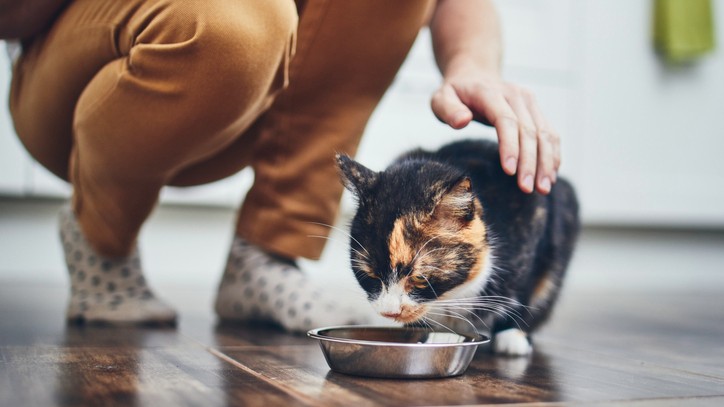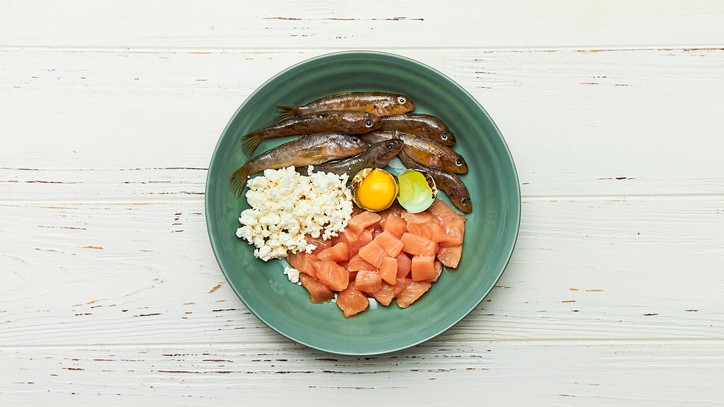Is homemade cat food better than store bought? A vet answers
Wanting to make homemade cat food for your feline friend? Here’s what you need to know before you hit the kitchen…

Thinking of whipping up some homemade cat food to tempt the taste buds of your feline friend? Well, before you get cooking, it’s important to understand the pros and cons of forgoing the best cat food in favor of your own creations.
From medical issues and having a picky eater on your hands to wanting to save on money and ensure your cat is getting the highest quality ingredients in their diet, there are lots of reasons why changing cat food might be a priority for you.
However, the best dry cat food and the best wet cat food has been specially formulated to provide a complete and balanced meal that contains everything your kitty needs to thrive — something that is hard to achieve with homemade cat food.
Many pet owners don’t realize how complex the process of creating a nutritionally complete diet can be. To help you understand the risks and benefits of store-bought vs. homemade cat food, Dr. Elizabeth Racine is here to fill you in on everything you need to know.

Dr Elizabeth Racine graduated in 2017 as a Doctor of Veterinary Medicine. She now specializes in veterinary behavior, nutrition, and internal medicine. Dr Racine also works as a freelance writer, writing for major companies in the industry such as the American Kennel Club.
Understanding the basics of feline nutrition
Veterinary nutrition is an incredibly complex topic, but there are some basic facts that pet owners should know.
The most important fact to consider when feeding your cat is that cats are obligate carnivores. This means that cats must eat meat to survive. This is different from dogs and humans, who are omnivores. Cats have a higher dietary protein requirement than many other species and are adapted to digest and metabolize meat.
While cats can digest and utilize nutrients from plants, they cannot adequately meet their nutritional needs from plants alone. A cat fed a strict vegetarian or vegan diet for any significant length of time will ultimately develop nutritional imbalances that can lead to severe illness or even death.
Get the best advice, tips and top tech for your beloved Pets
That said, this doesn’t mean that you can put a bowl of meat in front of your cat and call it a day! A meat-only diet also does not satisfy a cat’s unique nutritional needs. Cats must have certain vitamins and amino acids supplemented as part of their diet.
One of the biggest concerns is taurine, an amino acid involved in several body processes. Unlike many other mammals, cats cannot produce their own taurine and must acquire it from food. Cats that do not receive enough taurine in their diets can develop life-threatening heart disease and may go blind from retinal degeneration.
Deficiencies in other nutrients – such as arginine, vitamin A, or Vitamin D – can have similarly devastating consequences. Cat food must be nutritionally complete and carefully balanced to keep your cat healthy.
How to make homemade cat food

While it’s not impossible for a cat to thrive on a homemade diet, it is very difficult to create a homemade cat food that is nutritionally complete and balanced. This is why most veterinarians recommend keeping your cat on a commercial cat food.
If you search the internet for homemade cat food recipes, you’ll find thousands of results. Unfortunately, most of these recipes have been created by people with little to no knowledge of feline nutrition. They often do not provide all the nutrients your cat needs and feeding these homemade cat foods long term can have disastrous results.
If you’re absolutely set on feeding your cat a homemade diet, then you must consult a board certified veterinary nutritionist. A board certified veterinary nutritionist is a veterinarian who has completed years of additional training in animal nutrition and has been certified to practice as a specialist in this field. A veterinary nutritionist will develop an appropriate recipe to meet your cat’s unique nutritional needs. They will also take into account individual factors such as your cat’s age, lifestyle, and overall health. The recipe they create will use ingredients that are readily available in your local area and will often include supplements to ensure the diet is complete and balanced.
Once you receive a recipe for homemade cat food from a board certified veterinary nutritionist, it is very important that you follow it carefully. Each ingredient must be measured and added to the food in appropriate quantities. Even seemingly harmless changes - like adding extra of your cat’s favorite ingredient or swapping one ingredient for another – can alter the nutrient profile of the diet and lead to problems in the long run. A homemade cat food requires a delicate balance and is often time-consuming to achieve, which is why many pet owners prefer store-bought cat food.
Is store-bought cat food healthy for my cat?
Store-bought cat food has many advantages over homemade cat food. Commercially prepared cat foods are already complete and balanced, which means they contain all of the nutrients your cat needs to thrive. You won’t need to worry about weighing out ingredients or purchasing the appropriate supplements. Store-bought cat food is also readily accessible and far more convenient for most pet owners than attempting to adhere to a homemade diet.
Many pet owners worry about whether store-bought cat food is safe and healthy for their cat. With so many misconceptions about pet food and with such a wide variety of options available, it can be difficult to know what is best for your cat. The good news is that with so many products on the market, there are absolutely options available that are safe and nutritious for your cat.
Learning how to read a pet food label can help alleviate the common concerns about pet food so you can make better choices for your cat. When choosing a cat food for your cat, make sure you take into account factors such as your cat’s age, current weight, activity level, and health status, and choose a food that will adequately meet these needs.
If you have questions about which commercial diets are best for your cat, your veterinarian is your best resource for product recommendations and nutritional advice. The World Small Animal Veterinary Association (WSAVA) also recommends contacting the manufacturer of your cat’s food and asking questions about how it was formulated and produced. This is a great way to ensure that your cat’s food was developed by a veterinary nutritionist and subjected to appropriate quality control during production. All of this will allow you to make an informed decision and choose a diet that best fits your cat’s needs.
How much should I feed my cat?
If you’re feeding your cat a homemade diet, it should be formulated by a board certified veterinary nutritionist to ensure that the diet is complete and balanced. The veterinary nutritionist will tell you exactly how much to feed in order to maintain your cat at a healthy weight. Be sure to follow the nutritionist’s instructions closely, as even minor changes in the diet formulation can lead to nutritional deficiencies or excesses that can cause health problems for your cat long term. By following the diet plan as prescribed, you’ll ensure that your cat is receiving the right balance of nutrients and the right amount of calories to maintain a healthy lean body weight.
If your cat is eating a store bought diet, determining how much to feed can be a little tricky. Ideally, you should ask your veterinarian to calculate your cat’s required daily calorie intake. This number is based on a formula which takes into account your cat’s life stage, current weight, and body condition score. If you’re unable to do this and your cat is young, healthy, and not overweight, you can also use WSAVA’s Calorie Needs Chart to get a rough estimate of how much your cat should eat per day.
Once you have your cat’s required daily calorie intake, look on the back of your cat food bag or can to find the calorie content of the food you are feeding and use this to determine how much to feed your cat per day.
Whether you’re feeding a homemade diet or a store bought cat food, don’t forget that treats, table scraps, food toppers, and supplements count as calories, too! No more than 10% of your cat’s daily calorie intake should come from these extras. Otherwise, your cat may become overweight and risk weight-related illnesses like osteoarthritis and heart disease.
Always consult your vet
When it comes to homemade cat food, meeting your cat’s nutritional needs can be tricky. Always consult your veterinarian or a veterinary nutritionist before starting your cat on a homemade diet. When in doubt, stick with a diet that is already complete and balanced, so you’ll be sure to meet your cat’s unique nutritional needs
Dr. Elizabeth Racine is a small animal general practice vet covering all things pet health and wellness. Her special interests include veterinary behavior, nutrition, and internal medicine.
As a freelance writer, Dr. Racine has written content for major companies in the industry such as the American Kennel Club, Merck Animal Health, Bayer PetBasics, Elanco, and CareCredit. In her free time, Dr. Racine enjoys playing trampoline dodgeball, hiking with her beagle Dasher, and spending time with her three mischievous cats.
